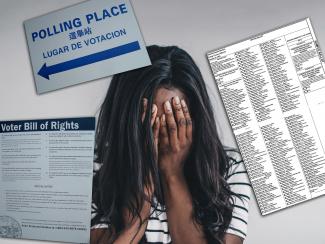
Via Flickr
Missing provisional ballots. Massively long lines. Lack of registration updates. Polling place closures. Changing identification requirements. Throughout the United States, a little-discussed issue is having a huge impact on voter turnout, and could be radically changing election results: voter confusion.
That’s what was going on in Modesto, CA, last year.
“They were told ‘You can't vote here,’” says Modesto attorney Lisa Battista, a polling station volunteer coordinator. “[T]hey left and we'll never know if they went and found another place to vote or if they just went home and forgot about it.” She appealed to county courts to keep polling locations open later to accommodate confusion, but was denied.
Raul Macias, of the ACLU of California’s Voting Rights Project, says confusion isn’t voters’ fault. “I don’t know how they can be expected to be experts in election law," he said. "Even the election official was confused about what was allowed here.”
Across the nation, thousands of would-be voters are turned away, prevented from voting, vote incorrectly, or otherwise have their citizenship curtailed because of confusion about how to actually vote.
“The United States’ byzantine election system is governed by overlapping rules on the county, state, and federal levels,” reports Kira Lerner. “Elections in different states and even different cities are held on different days, with polling places in varying locations and voting hours that change from one year to the next.”
“Together, the laws and procedures result in a chaos that undermines faith in elections, and that is easily exploited by politicians in the name of election integrity.”
As voter ID and other laws make voting more difficult, social media companies attempt to stem the impact of Russian trolling and hacking, and some states battle gerrymandering, millions of voters are confused.
Some are confused about where their polling place is. Some about whether or not they can vote by mail. Some as to why they are being asked to fill out a “provisional” ballot rather than a standard one. Some are even confused by the ballots themselves: the infamous 2000 “hanging chad” debacle that may have won George W. Bush his presidency is perhaps the most notorious example.
The 2000 election, especially, encouraged the Lawyer’s Committee to create its Election Protection Commission, which “works year-round to ensure that all voters have an equal opportunity to vote and have that vote count.” The commission brings together more than 100 local and national partners to inform the public about voting rights and dispel confusion.
One of the primary ways is by running 1-866-OUR-VOTE, a voter information helpline that anyone can call to get voting questions answered (they also partner with organizations running similar helplines in a number of languages including Spanish, Arabic, Mandarin, Tagalog, and more).
They also can connect voters with volunteer lawyers who can answer questions or help if it appears that one’s right to vote is being compromised. Do you have any questions about registering to vote, the process in your local area, or need a lawyer’s support?
Call 1-866-OUR-VOTE (1-866-687-8683) for support!